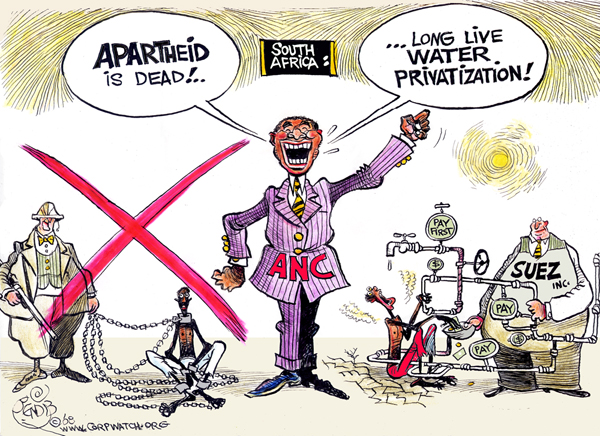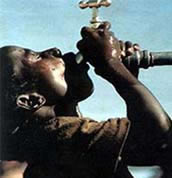The impact of privatisation is worst in developing countries. In South Africa, the World Bank prepared the ANC even before it came to power with “reconnaissance missions” to  promote privatisation and “full cost recovery”. Nelson Mandela (pictured) embraced privatisation when he became president in 1994 saying “Privatization is the fundamental policy of our government. Call me a Thatcherite, if you will.” Their ensued a bevy of consultants and advisors from the US, the UK, the World Bank and the IMF which helped the government put together a Growth, Employment and Redistribution Strategy in 1996 which was essentially a voluntary structural adjustment program. It included a policy of full cost recovery. Thabo Mbeki, who became president in 1999, continued with these same policies.
promote privatisation and “full cost recovery”. Nelson Mandela (pictured) embraced privatisation when he became president in 1994 saying “Privatization is the fundamental policy of our government. Call me a Thatcherite, if you will.” Their ensued a bevy of consultants and advisors from the US, the UK, the World Bank and the IMF which helped the government put together a Growth, Employment and Redistribution Strategy in 1996 which was essentially a voluntary structural adjustment program. It included a policy of full cost recovery. Thabo Mbeki, who became president in 1999, continued with these same policies.
George Monbiot reported in The Guardian:
The corporations loved it. KPMG told its clients that if they went to South Africa, they’d ‘find a major business opportunity about to burst forth in a country where there is a lot of good will towards UK’… The agency keeping the South African government on track is Britain’s Department for International Development (DFID). This year it is giving £6.3 million to the Adam Smith Institute – the ultra-rightwing privatisation lobby group – for ‘public sector reform’ in South Africa. Staggeringly, the Institute has been given its own budget – £5m of British aid money – to disburse as it pleases.

As a result thousands have lost their jobs, increasing unemployment from 17 percent in 1995 to 30 percent in 2002 and deepening poverty. People who managed to hold jobs during apartheid, have found that privatisation has taken their jobs, increased their electricity bills, and then cut them off when they couldn’t pay. According to a South African government study, ‘full-cost recovery’ for water and electricity services, in preparation for and as a consequence of privatisation, has resulted in more than 10 million people, 25% of the population having these services disconnected since 1998.
 Although water meters were ruled illegal in the UK in 1998 because they deprived people of their right to water, they were subsequently installed in South Africa. Even communal taps were equipped with meters that required a prepaid water card for people to get water from them. Two million people have been forced out of their homes for not paying their water or electricity bills. When 30% of the state-owned telecommunications company, Telkom, was sold, the cost of local calls increased dramatically and phone lines in poorer households had to be disconnected.
Although water meters were ruled illegal in the UK in 1998 because they deprived people of their right to water, they were subsequently installed in South Africa. Even communal taps were equipped with meters that required a prepaid water card for people to get water from them. Two million people have been forced out of their homes for not paying their water or electricity bills. When 30% of the state-owned telecommunications company, Telkom, was sold, the cost of local calls increased dramatically and phone lines in poorer households had to be disconnected.
This policy of ‘full cost recovery’ or user pays, was introduced under pressure from the World Bank which maintained that there needed to be a “credible threat of cutting service”. The idea was that the money collected from this cost recovery could be used to improve the infrastructure. Yet full cost recovery in essential services is not expected in many of the more affluent countries, including the US. In a country that could afford to supply everyone with water, the imposition of market rules in South Africa prevents the cross-subsidisation that would be necessary to achieve this.
The result in South Africa was that water bills alone came to 30 percent of average family incomes (40% with electricity). Those who were disconnected from the water supply because they couldn’t afford it were forced to use contaminated sources of water, causing the spread of cholera and gastrointestinal diseases. More than 140,000 people have had cholera since 2000 and millions suffer diarrhoea. The government ended up having to spend millions of dollars trying to control South Africa’s worst outbreak of cholera which killed hundreds of people between 2000 and 2002. Yet the same water policies continue and prepayment meters have since been installed in Johannesburg.
Opposition to privatisation became the focus of a new struggle for poor South Africans. At one protest march a banner read: “We did not fight for liberation so we could sell everything we won to the highest bidder.”
In 2004 South Africa halted electricity privatisation and introduced subsidies for poor households, so that they received 50 kWh per month for free.